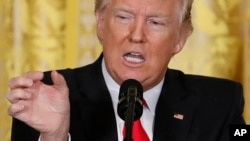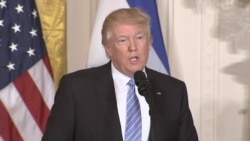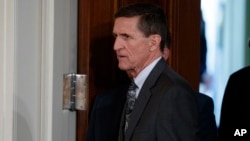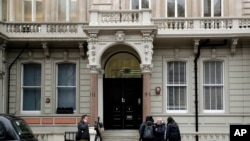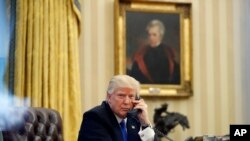President Donald Trump’s administration has been plagued by leaks of confidential information since before Trump was sworn into office, but the nature of the unauthorized disclosures is somewhat different from the leaks that have annoyed or enraged other U.S. presidents.
Leaks themselves, the premature, unofficial release of confidential policies, executive actions or plans, are nothing new, according to Louis Clark, executive director of the Government Accountability Project, a nonprofit group dedicated to protecting whistleblowers.
What's different
What is new, Clark told VOA, is the motive of the leakers, those who divulge the information, usually to journalists.
Clark said leaks coming from a U.S. administration generally are intended “to push a particular political or policy decision.”
What’s different about the leaks coming from the Trump administration, he added, is the impression many people have that the leaks are intended to harm the president and his reputation.
Direct criticism of a president in that way “is somewhat unprecedented,” Clark told VOA.
Jesselyn Radack is a former U.S. Justice Department lawyer experienced in national-security and human-rights issues who now works for the Whistleblower and Source Protection Program, established by the Institute for Public Accuracy. She contends there is something “more dangerous” about the Trump leaks than those that bedeviled former President Barack Obama, whose administration was hit by the largest leak of state secrets in U.S. history.
“Oftentimes, administrations leak trial balloons to push policy ideas,” Radack told VOA in an interview. “Trump’s leaks seem much more dangerous. They’re all over the place. They don’t seem like strategic leaks.”
Watch: Trump: Flynn Treated 'Unfairly' by 'Fake Media'
Flynn resigns under fire
Those leaks claimed their first victim this week when Trump’s national security adviser, General Michael Flynn, resigned under pressure.
In a series of tweets Wednesday morning, Trump said the leaks that brought down Flynn resembled tactics used in Russia, and he accused “fake news media” of using confidential information to fuel “their conspiracy theories and blind hatred.”
“The real scandal here is that classified information is illegally given out by ‘intelligence’ like candy. Very un-American!” Trump wrote.
The Flynn controversy arose before Trump was inaugurated, while the Obama administration was still in power, when The Washington Post reported on telephone conversations last year between Flynn and Russian Ambassador Sergey Kislyak. They included a chat just before the United States announced the expulsion of dozens of Russian diplomats and intelligence agents as a sanction against the Kremlin for Russia’s computer-hacking operations connected to the U.S. elections.
The question was whether and to what extent Flynn and Kislyak discussed the full range of sanctions against Russia, which Obama ordered in response to Russia’s annexation of Ukraine’s breakaway Crimean territory and for other reasons.
The supposition was that Flynn may have overstepped his role by urging Russia to avoid immediate tit-for-tat expulsions against American diplomats — the tactics the White House and the Kremlin have used in such disputes since the beginning of the Cold War — and instead wait for the incoming U.S. president to review and possibly reconsider the entire issue of sanctions against Russia.
Were calls legal?
If that was what Flynn said to Kislyak, it would have been illegal, because the retired general did not yet have an official role in government and would have been usurping the role of diplomats representing Obama.
Flynn denied last month that he had discussed sanctions with the Russian ambassador, but later changed his story and said he could not remember whether sanctions were discussed. By this time, some details of the Flynn-Kislyak conversations had been leaked to The New York Times as well as The Post.
He resigned late Monday night.
Benefit to the public
The whistleblower advocates VOA spoke with said government employees generally allow confidential information to become public if they believe knowledge of that information would benefit the general public, what they called “public interest” leaks.
Radack said exposing the conversations between Flynn and Kislyak fit that definition “on some level.”
“To the extent that leaks about Flynn revealed government misconduct, that would count as whistleblowing,” she said.
Similarly, Clark told VOA: “When there’s a leak that involves a false statement, then I don’t think you can assume that the agents are engaged in a conspiracy to oppose the president.”
Constant stream of leaks
Several other high-profile leaks have shaken Trump’s transition team and his young administration.
The president has previously accused unnamed members of the U.S. intelligence community of leaking unsubstantiated information about his reputed personal conduct on a visit to Moscow years ago, long before he ever contemplated a career in politics.
A 35-page dossier summarizing allegations of salacious activity by Trump was published in full last month by Buzzfeed News. The report, compiled by a former British spy, did not include specific evidence against Trump but suggested that Russian intelligence agents had compromising material that could be used to blackmail the president.
“It was disgraceful,” Trump said of the leaked dossier, “disgraceful that the intelligence agencies allowed [out] any information that turned out to be so false and fake.” Disavowing the allegations against him completely, the president declared at a news conference last month: “That’s something that Nazi Germany would have done and did do.”
Telephone disputes aired
Embarrassing and unflattering details also have emerged over the past four weeks about some of Trump’s telephone calls with foreign leaders, a traditional task for a new U.S. president.
Among those conversations was one with Australian Prime Minister Malcolm Turnbull, which turned from cordial to less than friendly, according to The Washington Post, after Trump bragged about the size of his election victory and denounced a deal struck between Canberra and the White House under Obama, calling for the United States to accept thousands of refugees that Australia had been unwilling or unable to resettle.
Trump disputed all of the colorful reports about his alleged spat with Turnbull as “fake news,” tweeting: “Thank you to Prime Minister of Australia for telling the truth about our very civil conversation that FAKE NEWS media lied about. Very nice!”
Another controversial conversation, between Trump and Mexican President Enrique Pena Nieto, was leaked to The Associated Press, which reported that Trump had threatened to send U.S. troops across the border into Mexico to deal directly with “bad hombres” there if Nieto could not control them. Both the White House and the Mexican government denied that account.
Calls for investigation
Since Flynn left this week — he said he resigned, Trump said he was fired — leading Republican lawmakers have called for an investigation of the repeated leaks, which House Oversight Committee Chairman Jason Chaffetz said raise “serious concerns.”
In a letter to the Department of Justice’s internal investigator, Inspector General Michael Horowitz, Chaffetz and the chairman of the House Judiciary Committee, Bob Goodlatte, asked for an immediate probe to learn “whether classified information [about Flynn] was mishandled.”
During a lengthy news conference Thursday in which he repeatedly assailed White House reporters for “fake news,” Trump said he wanted to track down and punish “criminal leaks.”
“I don’t want classified information getting out to the public. ... What’s going to happen when I’m dealing on the Middle East?” Trump said. “What’s going to happen when I’m dealing with really, really important subjects like North Korea? We’ve got to stop it.”
These developments have sounded alarm bells, Radack said, along with concerns that Trump will continue or even expand the Obama administration’s “really unfortunate” efforts to uncover government whistleblowers. “That really does open a Pandora’s box of problems.”
Obama cracked down on leaks
The Obama administration aggressively investigated suspected leakers and the journalists who worked with them. At least eight whistleblowers were prosecuted under the Espionage Act, compared with only three other cases since the law was passed in 1917.
Two of the country’s most high-profile leaks cases, involving hundreds of thousands of classified military documents and details of super-secret surveillance programs, occurred during Obama’s time in office:
Chelsea Manning, a former Army private (known at the time as Bradley Manning), handed over the secrets he stole in 2009 to the group WikiLeaks, which published them all online in what was considered the largest leak of state secrets in U.S. history. He was sentenced to 35 years in prison, a much harsher penalty than anyone else prosecuted under the Espionage Act received, but Obama reduced the sentence before leaving office, and Manning is now due to be set free in a few months.
Edward Snowden, a contractor for the National Security Agency, stole enormous quantities of classified information a few years later, including details of previously unknown surveillance programs that gathered private information from government officials and ordinary people worldwide. He now lives in Russia, where he sought and was granted political asylum, but faces two serious criminal charges if he ever returns to U.S. jurisdiction.
Others prosecuted under the Obama administration include former CIA analyst John Kiriakou, sentenced to 30 months in prison for revealing the CIA’s secret torture program, and Shamai Leibowitz, a former FBI translator who got 20 months in prison for telling a blogger about U.S. spy operations against Israeli diplomats.
Will the leaks continue?
Both whistleblower advocates interviewed by VOA, Louis Clark and Jesselyn Radack, said they believe the leaks will continue to hamper Trump’s presidency, even though, as Clark said, “There has been an extraordinary amount of leaking from this administration in just the first month.”
Radack said the leaks are meant to serve a “corrective purpose” for people in government who disagree with Trump’s policy decisions.
“To the extent that Trump continues to operate in excess of his authority and outside the normal boundaries of the presidency, I think the leaks will keep coming,” she said. “Leaks are the American way. They go all the way back to Benjamin Franklin; they’re a time-honored tradition in America.
Trump, who has offered several conflicting theories about who leaks information and their motivation during the past month, has his own take on the problem. He blames government employees who are holdovers from the Obama administration, and adds: “I think you’ll see it’s stopping now [that] we have our people in.”




